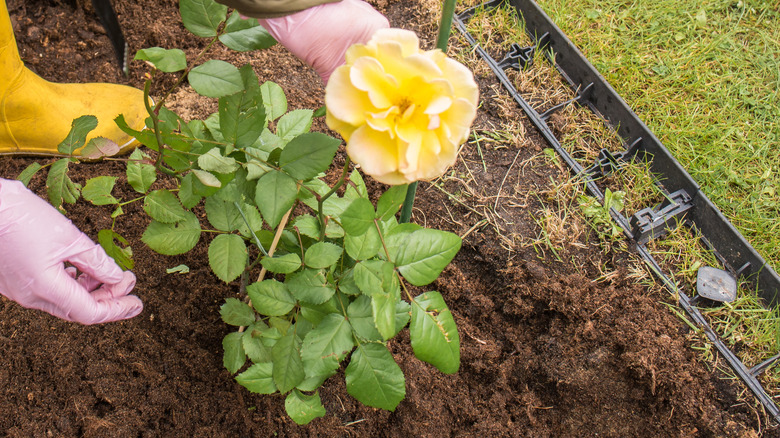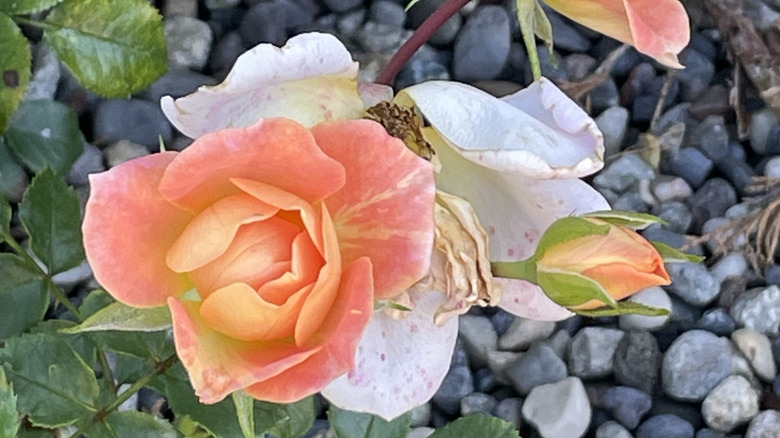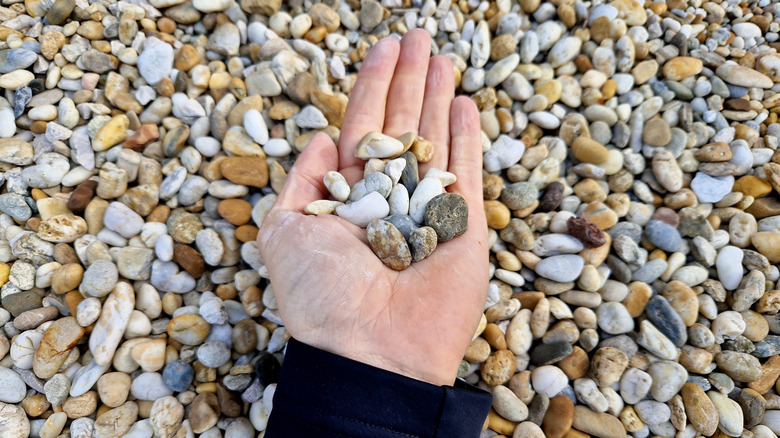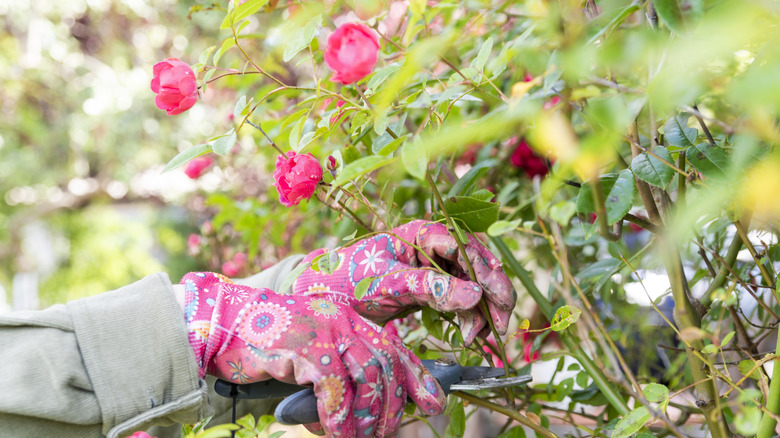Is Gravel Mulch A Good Choice For Your Rose Garden? Here's What To Know
Roses are a classic addition to any garden, but they have a reputation for being somewhat fussy to care for. In recent years, some easy care rose varieties, like the long-blooming Knockout roses, and various hybrids, have made roses seem like a less daunting choice for the flower garden. But roses still have basic needs to keep them healthy and thriving, including a good mulch. One type of mulch that is not good for roses is gravel.
The gravel mulch trend seems to show no sign of stopping. I get it: It can make your flower bed look very polished and professional and like a page out of a magazine. At first. Then, gravel as mulch, slowly but surely (in my experience) becomes a bit of a nightmare. As a professional gardener, I have seen many clients regret choosing gravel mulch for their flower beds, including gravel around their roses.
Gravel is a poor choice for roses for a number of reasons, the main one being that it absorbs heat and this can dry out the soil around their roots. This can not only lead to the roots becoming damaged, but can also interfere with various aspects of a rose's growth cycle, including moisture retention and nutrient uptake from soil, both of which are important aspects of rose care to help them stay vibrant. So these are some things to think about before choosing to use gravel as a mulch option for roses.
Why gravel mulch is bad for roses
Roses prefer a loamy, rich, well-drained soil that is slightly acidic (with a pH between 6.0 and 6.5). Soils that are slightly acidic usually get that way because they contain organic matter, and organic matter is more likely to remain in soil when it can retain some moisture, but also has a somewhat loose, soft texture. When used as mulch, gravel can have two common impacts that can negatively affect the soil around your roses.
First, gravel's tendency to absorb heat dries out soil moisture, and that moisture is what holds organic matter in place, so gravel may cause a loss of soil nutrition. The increased heat in winter can also cause earlier melting in spring, which may cause the roots to become soggy or waterlogged. Second, gravel as mulch tends to weigh soil down and cause compaction, which means the soil's texture becomes hard and difficult to work with. For roses, this spells trouble because these plants perform best when certain soil amendments are added (like milky spore, which is a good Japanese beetle repellent, or compost to maintain nutrients and texture), and compaction makes it difficult to add soil amendments at the base of the plant.
Because roses are floriferous plants (i.e., they flower across a long season), they require healthy soil to thrive. Also, roses are long-lived shrubs that need consistent care, including regular pruning, and measures to prevent pests or diseases, to help them bloom their best. For thriving roses, soil health is crucial, and using gravel as mulch is really not conducive to long-term soil health for flowering plants.
Problems with gravel mulch
While gravel mulch has become a more popular option for certain landscaping designs, including xeriscaping and rain gardens, it's important to understand that it's not a suitable choice for all garden situations. I think gravel looks nice as a sort of finishing touch for a low-care situation (such as placing it around certain hardy, robust shrubs). It's also good for plants that like dry, sandy soil, such as lavender or sedums. But for plants that like a moist, loamy, rich soil (like roses! also astilbes, phlox, pinks, daisies, and coneflowers), gravel tends to cause moisture and nutrients to leach out over time. This is because the gravel's heat-holding qualities will quite literally "fry" soil in the hot summer season.
In addition to the heat issue, gravel's texture causes problems with moisture retention in soil. Consider how gardeners will use gravel in the base of a pot to improve drainage — and theoretically it can improve drainage in flower beds. But garden soil and the potting mix used in containers are different, and some garden soils over time will stick to gravel and form large lumps that actually interfere with drainage, as well as impinging root growth.
One aspect of using gravel for mulch that appeals to gardeners is the fact that it doesn't break down over time. But natural mulches that break down add nutrients to the soil, and this is a very desirable thing. Also, some weeds absolutely love to grow in gravel (especially the kind that thrive in thin soils and in sidewalk cracks), and can be hard to eradicate once they take hold.
Better mulch alternatives for roses.
Using mulch on roses is definitely a good idea. Mulch helps regulate moisture and temperature, keeps weeds at bay, and also protects the rose's roots. Since roses like to have a rich soil, natural mulches are the best choice, because they break down into soil and add important nutrients and improve texture. I've used a number of different natural mulches for roses.
One botanical garden I worked at liked to use natural mulches like fallen leaves or pine straw (i.e. long dried pine needles). These are both great sustainable options since they fall from trees, and also break down into the soil nicely. Pine needles can be quite acidic so I tend to only use them in winter, since they help keep some air flow and insulate the roots of shrubs like roses. Then I remove the pine straw in spring and use shredded pine bark, which is my favorite mulch to use for roses (and for flower gardens in general).
Shredded pine bark is an attractive reddish brown color and has a handsome, uniform texture. It also lends a bit of acidity to soil when it breaks down, helping to maintain the soil pH that roses prefer. The pine bark nuggets can be used, but I prefer the shredded kind, when I can get it, because it breaks down faster and I love how it looks. I've also used natural wood chips, and these also break down well, but more slowly than bark. All of these natural wood-based mulches are good for roses and will improve their soil nutrition and texture.



